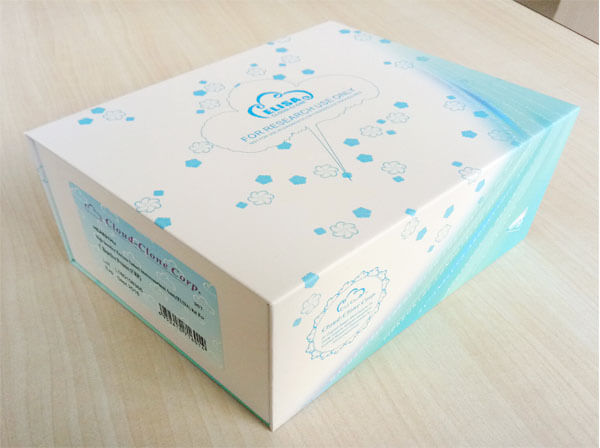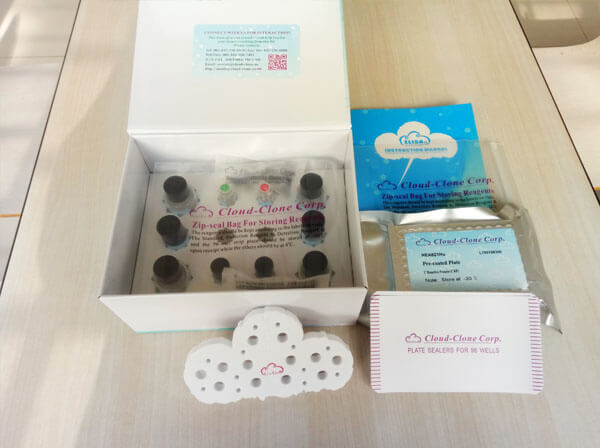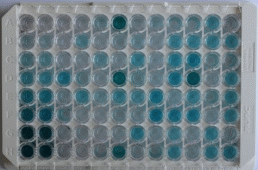Instant ELISA Kit for Progesterone (PG) 

P4; Pregn-4-Ene-3,20-Dione
- UOM
- FOB US$ 669.00 US$ 955.00 US$ 4,298.00 US$ 8,118.00 US$ 66,850.00
- Quantity
Overview
Properties
- Product No.IEA459Ge
- Organism SpeciesPan-species (General) Same name, Different species.
- ApplicationsEnzyme-linked immunosorbent assay for Antigen Detection.
Research use only - Downloadn/a
- CategoryEndocrinologyReproductive scienceHormone metabolism
Sign into your account
Share a new citation as an author
Upload your experimental result
Review

Contact us
Please fill in the blank.
Recovery
Matrices listed below were spiked with certain level of Instant Progesterone (PG) and the recovery rates were calculated by comparing the measured value to the expected amount of Instant Progesterone (PG) in samples.
| Matrix | Recovery range (%) | Average(%) |
| serum(n=5) | 96-105 | 102 |
| EDTA plasma(n=5) | 83-90 | 87 |
| heparin plasma(n=5) | 79-101 | 80 |
Precision
Intra-assay Precision (Precision within an assay): 3 samples with low, middle and high level Instant Progesterone (PG) were tested 20 times on one plate, respectively.
Inter-assay Precision (Precision between assays): 3 samples with low, middle and high level Instant Progesterone (PG) were tested on 3 different plates, 8 replicates in each plate.
CV(%) = SD/meanX100
Intra-Assay: CV<10%
Inter-Assay: CV<12%
Linearity
The linearity of the kit was assayed by testing samples spiked with appropriate concentration of Instant Progesterone (PG) and their serial dilutions. The results were demonstrated by the percentage of calculated concentration to the expected.
| Sample | 1:2 | 1:4 | 1:8 | 1:16 |
| serum(n=5) | 83-96% | 91-99% | 78-97% | 94-103% |
| EDTA plasma(n=5) | 79-89% | 82-104% | 83-101% | 87-99% |
| heparin plasma(n=5) | 86-93% | 92-103% | 93-101% | 98-105% |
Stability
The stability of kit is determined by the loss rate of activity. The loss rate of this kit is less than 5% within the expiration date under appropriate storage condition.
To minimize extra influence on the performance, operation procedures and lab conditions, especially room temperature, air humidity, incubator temperature should be strictly controlled. It is also strongly suggested that the whole assay is performed by the same operator from the beginning to the end.
Reagents and materials provided
| Reagents | Quantity | Reagents | Quantity |
| Pre-coated, ready to use 96-well strip plate | 1 | Plate sealer for 96 wells | 4 |
| Standard | 5 | Standard Diluent | 1×20mL |
| Detection Reagent A | 1×120µL | Assay Diluent A | 1×12mL |
| TMB Substrate | 1×9mL | Stop Solution | 1×6mL |
| Wash Buffer (30 × concentrate) | 1×20mL | Instruction manual | 1 |
Assay procedure summary
1. Prepare all reagents, samples and standards;
2. Add 100µL standard or sample to each well. Incubate 30 minutes at 37°C;
3. Aspirate and add 100µL prepared Detection Reagent A. Incubate 30 minutes at 37°C;
4. Aspirate and wash 3 times;
5. Add 100µL prepared Detection Reagent B. Incubate 10 minutes at 37°C;
6. Aspirate and wash 5 times;
7. Add 90µL Substrate Solution. Incubate 10-20 minutes at 37°C;
8. Add 50µL Stop Solution. Read at 450nm immediately.

Test principle
The test principle applied in this kit is enzyme immunoassay. The microtiter plate provided in this kit has been pre-coated with an antibody specific to Instant Progesterone (PG). Standards or samples and HRP-labeled detection antibody specific to Instant Progesterone (PG) (Detection Reagent A) are then added to the appropriate microtiter plate wells. Next, TMB substrate solution is added, only those wells that contain Instant Progesterone (PG), and HRP-labeled detection antibody will exhibit a change in color. The enzyme-substrate reaction is terminated by the addition of sulphuric acid solution and the color change is measured spectrophotometrically at a wavelength of 450nm ± 10nm. The concentration of Instant Progesterone (PG) in the samples is then determined by comparing the O.D. of the samples to the standard curve.
Giveaways
Increment services
Citations
- Growth differential factor-9 inhibits testosterone production in mouse theca interstitial cells Pubmed: 23954356
- Prevention of preterm birth by progestational agents: what are the molecular mechanisms? Pubmed: 23433326
- The role of Sep (O-phosphoserine) tRNA: Sec (selenocysteine) synthase (SEPSECS) in proliferation, apoptosis and hormone secretion of trophoblast cellsPubmed: 23966103
- Neutrophil gene dynamics and plasma cytokine levels in dairy cattle during peri-implantation periodPubmed:27090626
- Assessment of ADMA, estradiol, and progesterone in severe preeclampsiaPubmed:27152507
- The Reproductive Toxicity of CdSe/ZnS Quantum Dots on the in vivo Ovarian Function and in vitro Fertilizationpubmed:27876896
- Molecular characterization of insulin resistance and glycolytic metabolism in the rat uteruspubmed:27461373
- Metformin Ameliorates Uterine Defects in a Rat Model of Polycystic Ovary Syndrome.pubmed:28336389
- Exposure of pregnant mice to perfluorobutanesulfonate causes hypothyroxinemia and developmental abnormalities in female offspringpubmed:27803384
- Middle-Aged Diabetic Females and Males Present Distinct Susceptibility to Alzheimer Disease-like Pathology.pubmed:27730513
- Exposure of pregnant mice to triclosan impairs placental development and nutrient transport.pubmed:28322267
- Acute administration of oestradiol or progesterone in a spinal cord ischaemia–reperfusion model in ratspubmed:29049608
- Exposure of Pregnant Mice to Triclosan Causes Insulin Resistance via Thyroxine Reductionpubmed:28973666
- The anorectic agent, lorcaserin, disturbs estrous cyclicity and produces endometrial hyperplasia without affecting ovarian population in female ratspubmed:28599864
- Progesterone attenuates hypertension and autoantibody levels to the angiotensin II type 1 receptor in response to elevated cadmium during pregnancy10.1016:j.placenta.2017.12.004
- The biocompatibility studies of polymer dots on pregnant mice and fetusespubmed:29071192
- Beneficial effects of Heqi san on rat model of polycystic ovary syndrome through the PI3K/AKT pathwaypubmed:29020999
- Impact of Perfluorooctane Sulfonate on Reproductive Ability of Female Mice through Suppression of Estrogen Receptor a-Activated Kisspeptin Neurons10.1093:toxsci
- Impact of Triclosan on Female Reproduction through Reducing Thyroid Hormones to Suppress Hypothalamic Kisspeptin Neurons in MicePubmed:29403355
- Up-Regulation of Long Noncoding RNA SRA Promotes Cell Growth, Inhibits Cell Apoptosis, and Induces Secretion of Estradiol and Progesterone in Ovarian …Pubmed:29674607
- Prostaglandin E2 triggers cytochrome P450 17α hydroxylase overexpression via signal transducer and activator of transcription 3 phosphorylation and promotes …10.3892:ol.2018.9165
- Crocetin attenuates DHT-induced polycystic ovary syndrome in mice via revising kisspeptin neuronsDoi: 10.1016/j.biopha.2018.08.135
- Uterine progesterone signaling is a target for metformin therapy in polycystic ovary syndromePubmed: 29535146
- Endometrial mesenchymal stem cells isolated from menstrual blood repaired epirubicin-induced damage to human ovarian granulosa cells by inhibiting the …Pubmed: 30606243
- Dihydrotestosterone synthesis in the sheep corpus luteum and its potential mechanism in luteal regressionPubmed: 30671954
- Tanshinone IIA attenuates estradiol‑induced polycystic ovarian syndrome in mice by ameliorating FSHR expression in the ovary
- Reduced serotonin impairs long-term depression in basolateral amygdala complex and causes anxiety-like behaviors in a mouse model of perimenopausePubmed: 31377402
- Evidence that downregulation of Wilms' tumor 1 (WT1) is involved in cortical stromal cell differentiation into theca cells in adult bovine ovariesPubmed: 31490589
- Baicalin ameliorates polycystic ovary syndrome through AMP-activated protein kinasePubmed: 31722718
- Exposure of adult mice to perfluorobutanesulfonate impacts ovarian functions through hypothyroxinemia leading to down-regulation of Akt-mTOR signalingPubmed: 31809938
- An antibody-aptamer sandwich cathodic photoelectrochemical biosensor for the detection of progesteronePubmed: 32339148
- Serum Progesterone and Testosterone Levels in Schizophrenia Patients at Different Stages of TreatmentPubmed: 33159671
- Prenatal exposure of female mice to perfluorononanoic acid delays pubertal activation of the reproductive endocrine axis through enhanced hepatic FGF21 …Pubmed: 33131727
- MiRNAs expression profiling of rat ovaries displaying PCOS with insulin resistancePubmed: 32757043
- Guoqi Liu1, Juan Li2, 3, Peng Cui2, Susanne Lager5, Amanda Nancy Sferruzzi-Perri6, Wei Li1, Xiao-ke Wu1, Yanhua Han1, Mats Brännström7, Linus R Shao2 …Pubmed: 31206177
- Pathophysiological Changes in Female Rats with Estrous Cycle Disorder Induced by Long-Term Heat StressPubmed: 32685488
- Wilms' tumor (WT1)(+/-KTS) variants decreases the progesterone secretion of bovine ovarian theca cellsPubmed: 32739762
- Implantation associated changes in expression profile of indoleamine-2, 3-dioxygenase 1, Th1-Th2 cytokines and interferon-stimulated genes on neutrophils and …Pubmed: 32846354
- Therapeutic effects of organic zinc on reproductive hormones, insulin resistance and mTOR expression as a novel component in a rat model of PCOS
- Improving reproductive efficiency through the supplementation of mustard oil, poly-herbal mixture and butyric acid during the periparturient period in Sahiwal …
- A preliminary study on the mechanism of the neurosteroid-mediated ionotropic receptor dysfunction in neurodevelopmental toxicity induced by?¡33862428
- MiR-145 regulates steroidogenesis in mouse primary granulosa cells through targeting Crkl34273377
- Effects of a Nanoencapsulated Moringa Leaf Ethanolic Extract on the Physiology, Metabolism and Reproductive Performance of Rabbit Does during Summer34439574
- Zika virus infection in the ovary induces continuously elevated progesterone level and compromises conception in interferon α/β receptor-deficient mice34730391









